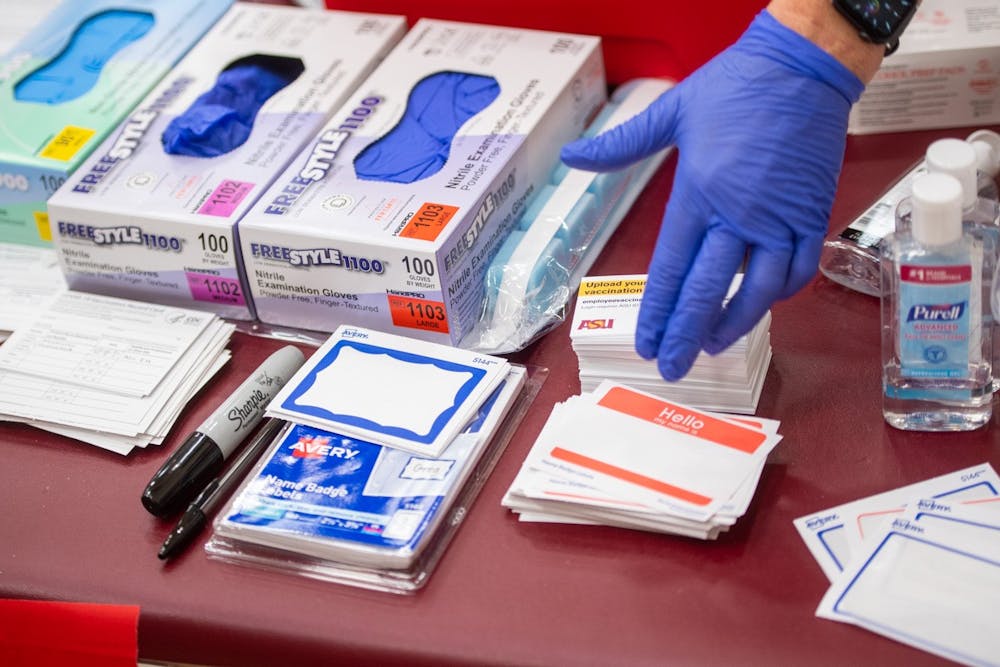Heading into the fourth academic year impacted by the COVID-19 pandemic, ASU community members can expect minimal COVID-19 policy changes so far, but there are new considerations around the monkeypox virus outbreak, which was declared a national health emergency on Thursday.
Here's what to know about COVID-19 and monkeypox as people return to ASU's campuses ahead of the academic year's start date of August 18.
COVID-19
ASU announced no major changes to COVID-19 policies and guidelines for the Fall 2022 semester, according to an email Monday from Nancy Gonzales, executive vice president and University provost, and Morgan Olsen, executive vice president, treasurer and CFO.
Free COVID-19 tests are available to students, employees and their dependents, with results within 48 hours of sample pickup; vaccinations and boosters are available; and anyone who displays symptoms or tests positive for COVID-19 should stay home, the email said.
The University will follow guidelines from Maricopa County and the Centers for Disease Control and Prevention, the email said. According to the CDC, Maricopa County's COVID-19 community level is low. For that level, the CDC recommends people stay up to date with vaccinations and get tested if they have symptoms.
According to an update to ASU's website on Thursday, the University continues to expect all employees, including student workers, to either be vaccinated against COVID-19 or have a medical or religious exemption on file.
Unlike the beginning of the Spring 2022 semester, the University will not require students to submit proof of negative COVID-19 tests before returning to campus.
Masks are recommended but not required on ASU campuses. The University continues to offer free N95 respirators for use by employees upon request.
In an Aug. 1 update, ASU reported 77 positive COVID-19 cases in the ASU community. Of those cases, 45 were among faculty and staff, and 32 were among the "post-graduation, pre-fall enrollment student body."
The update said 1,088 tests had been administered, giving a percent positivity rate of 7%. Five of the known cases were among students living on ASU campuses. The previous update on July 22 reported 85 known cases among faculty and staff.
Monkeypox
ASU has access to testing for monkeypox if there is a suspected case, according to an email from an ASU spokesperson on July 27. Students can be tested and treated for monkeypox at ASU Health Services, according to a message sent to students by Aaron Krasnow, director of ASU Health and Counseling Services, and Mario Islas, ASU Health Services medical director, on August 11.
Students can schedule appointments with ASU Health Services through the MyHealth.asu.edu portal or by calling 480-965-3349.
The University will not be offering monkeypox virus vaccines, but "will respond accordingly if there are changes in availability or priority for vaccination," the spokesperson said.
On June 7, the Maricopa County Department of Public Health and the Arizona Department of Health Services announced the first identified monkeypox case in the state. The Centers for Disease Control and Prevention reported 9,492 monkeypox cases nationwide as of Tuesday, and reported cases in Arizona have increased to 119 as of Monday, according to the Maricopa County Department of Public Health.
Most known monkeypox cases in Arizona are in Maricopa County, but on July 12, Pima County announced the first monkeypox case outside the Phoenix area.
According to the CDC, monkeypox spreads through skin-to-skin contact, intimate sexual contact or touching a surface that has been used by someone with the virus. The CDC advises people to get vaccinated if they have been exposed to the virus or are at high risk of getting it.
Symptoms can include a rash, sores, fever, muscle aches, exhaustion and more. The illness typically lasts two to four weeks but most people "fully recover from the virus without treatment," the county health department said.
Vaccines are available to high-risk people with "known or suspected high-risk exposure to an individual with monkeypox." This includes gay or bisexual men, other cis or trans men, or transgender women. These people must have had "intimate or sexual contact with other men in a social or sexual venue or multiple or anonymous partners," to receive the vaccine, the county said.
Anyone who shares a household with a person who tested positive for monkeypox is also eligible, as are health care providers at risk of being exposed.
According to the Administration for Strategic Preparedness and Response, in total, Arizona has been allocated 14,315 Jynneos monkeypox vaccine doses, and as of Monday, 7,933 doses had been shipped.
This story will be updated with information on the next Maricopa County vaccination clinics.
Reach the reporter at jkabiri@asu.edu and follow @jasminekabiri on Twitter.
Like The State Press on Facebook and follow @statepress on Twitter.

Jasmine Kabiri is the assignment editor at The State Press, overseeing and editing stories produced by the six digital desks. She has previously worked as a reporter at The Daily Camera and Cronkite News.




